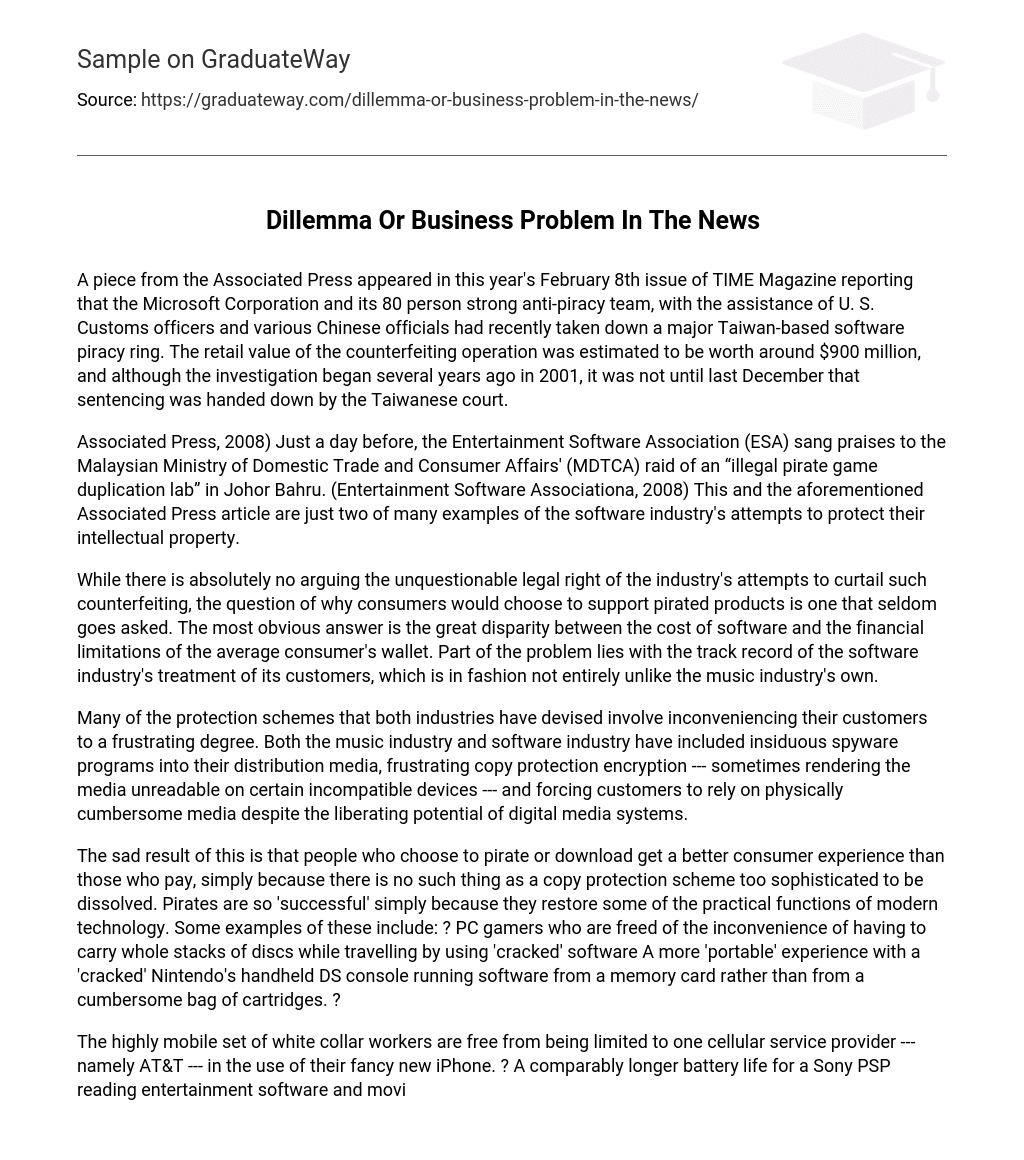A piece from the Associated Press appeared in this year’s February 8th issue of TIME Magazine reporting that the Microsoft Corporation and its 80 person strong anti-piracy team, with the assistance of U. S. Customs officers and various Chinese officials had recently taken down a major Taiwan-based software piracy ring. The retail value of the counterfeiting operation was estimated to be worth around $900 million, and although the investigation began several years ago in 2001, it was not until last December that sentencing was handed down by the Taiwanese court.
Associated Press, 2008) Just a day before, the Entertainment Software Association (ESA) sang praises to the Malaysian Ministry of Domestic Trade and Consumer Affairs’ (MDTCA) raid of an “illegal pirate game duplication lab” in Johor Bahru. (Entertainment Software Associationa, 2008) This and the aforementioned Associated Press article are just two of many examples of the software industry’s attempts to protect their intellectual property.
While there is absolutely no arguing the unquestionable legal right of the industry’s attempts to curtail such counterfeiting, the question of why consumers would choose to support pirated products is one that seldom goes asked. The most obvious answer is the great disparity between the cost of software and the financial limitations of the average consumer’s wallet. Part of the problem lies with the track record of the software industry’s treatment of its customers, which is in fashion not entirely unlike the music industry’s own.
Many of the protection schemes that both industries have devised involve inconveniencing their customers to a frustrating degree. Both the music industry and software industry have included insiduous spyware programs into their distribution media, frustrating copy protection encryption — sometimes rendering the media unreadable on certain incompatible devices — and forcing customers to rely on physically cumbersome media despite the liberating potential of digital media systems.
The sad result of this is that people who choose to pirate or download get a better consumer experience than those who pay, simply because there is no such thing as a copy protection scheme too sophisticated to be dissolved. Pirates are so ‘successful’ simply because they restore some of the practical functions of modern technology. Some examples of these include: ? PC gamers who are freed of the inconvenience of having to carry whole stacks of discs while travelling by using ‘cracked’ software A more ‘portable’ experience with a ‘cracked’ Nintendo’s handheld DS console running software from a memory card rather than from a cumbersome bag of cartridges. ?
The highly mobile set of white collar workers are free from being limited to one cellular service provider — namely AT&T — in the use of their fancy new iPhone. ? A comparably longer battery life for a Sony PSP reading entertainment software and movies from a memory stick rather than on a UMD. ? The ability to run software legally purchased from foreign countries and import markets on a Nintendo Wii that has been freed of region restrictions.
That said, none of this is to suggest that the pirate industry should be condoned for reaping illegal profit off of hardware and software developed by companies and people other than themselves. Rather, what this shows is that the ‘success’ of piracy can be attributed to the simple reason that they have given consumers a user experience that fits with the current level of technology. This despite the fact that companies with the legal right to do so, fail to understand that their existing business model is flawed.
While I still have particular complaints with the music industry, at least they are attempting to redress the situation. While there’s still a fair amount of people on the planet who refuse to pay for music, the fact that the industry has abandoned DRM (digital rights management) technologies on anything but online downloads is a sign that they’re beginning to recognize that not all their customers are potential criminals. Online music stores such as eMusic and iTunes are substantially more browse-friendly than any torrent site. Software companies should step up to such a challenge.





